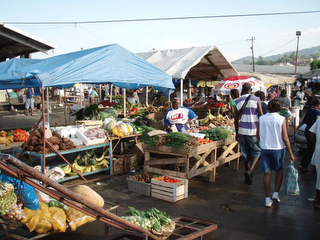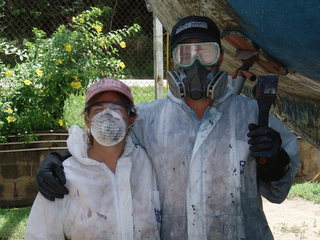One for the Record Books
Wednesday, September 27
Hog Island, Grenada
It's started. Last night Dean and I pointed Delilah north for the first time in almost 11 months, covering the first 80 miles of our long journey north in just over 13 hours. With our newly-painted bottom, plenty of wind, and a current that was actually pushing us the direction we wanted to go, we were going so fast for the first few hours that we worried that we would arrive in Grenada long before daylight! This is the first time in memory that we actually had to slow ourselves down while under sail.
We had a beautiful night, making 5 to 7 knots under double-reefed main and double-reefed genoa, with lots of stars and no squalls to keep us company. At dawn we were just a mile or so south of Grenda. We could see a heavy rainstorm making its way west along the coast, so we stalled for a few minutes and watched it sweep past us, obscuring the boats in the bay entirely and leaving a double rainbow in its wake.
We went first to Prickly Bay, where there is a customs and immigration office. I'm not sure the anchor had touched bottom before Dean and I were in our bathing suits and frolicking in the water beside the boat. After checking in we moved over to a sheltered bay behind Hog Island, which boasts a small, palm-topped, abandoned-looking, open-sided shack on a sandy beach, selling beer and soda and maybe rum. The proprieter lives in the shack, so the bar is open every day, all day. Rumor has it that the island has been purchased by the Four Seasons, so I supect the shack and the welcoming atmosphere will be gone within a year or so. Then again, developments in the Caribbean have a way of drying up before the ground is broken, or worse, after construction has scarred the landscape but before anything useful has been built. So much land here is in contractual limbo.
We are thrilled to be anchored next to Amanzi and Eira in a small bay on the south side of Grenada. There are almost no houses in this area, and certainly no oil rigs, giant-size marinas, or diesel-spilling commercial vessels. The water has gone blue again. The only noises I hear are our wind generator, pumping out free power, and the lap of wavelets against the hull of our faithful dinghy, finally floating after the fifth patch stuck. Trinidad was useful and social and cheap and lively, and we got a whole lot of work done on the boat, but this anchorage is what cruising is all about.
Hog Island, Grenada
It's started. Last night Dean and I pointed Delilah north for the first time in almost 11 months, covering the first 80 miles of our long journey north in just over 13 hours. With our newly-painted bottom, plenty of wind, and a current that was actually pushing us the direction we wanted to go, we were going so fast for the first few hours that we worried that we would arrive in Grenada long before daylight! This is the first time in memory that we actually had to slow ourselves down while under sail.
We had a beautiful night, making 5 to 7 knots under double-reefed main and double-reefed genoa, with lots of stars and no squalls to keep us company. At dawn we were just a mile or so south of Grenda. We could see a heavy rainstorm making its way west along the coast, so we stalled for a few minutes and watched it sweep past us, obscuring the boats in the bay entirely and leaving a double rainbow in its wake.
We went first to Prickly Bay, where there is a customs and immigration office. I'm not sure the anchor had touched bottom before Dean and I were in our bathing suits and frolicking in the water beside the boat. After checking in we moved over to a sheltered bay behind Hog Island, which boasts a small, palm-topped, abandoned-looking, open-sided shack on a sandy beach, selling beer and soda and maybe rum. The proprieter lives in the shack, so the bar is open every day, all day. Rumor has it that the island has been purchased by the Four Seasons, so I supect the shack and the welcoming atmosphere will be gone within a year or so. Then again, developments in the Caribbean have a way of drying up before the ground is broken, or worse, after construction has scarred the landscape but before anything useful has been built. So much land here is in contractual limbo.
We are thrilled to be anchored next to Amanzi and Eira in a small bay on the south side of Grenada. There are almost no houses in this area, and certainly no oil rigs, giant-size marinas, or diesel-spilling commercial vessels. The water has gone blue again. The only noises I hear are our wind generator, pumping out free power, and the lap of wavelets against the hull of our faithful dinghy, finally floating after the fifth patch stuck. Trinidad was useful and social and cheap and lively, and we got a whole lot of work done on the boat, but this anchorage is what cruising is all about.






